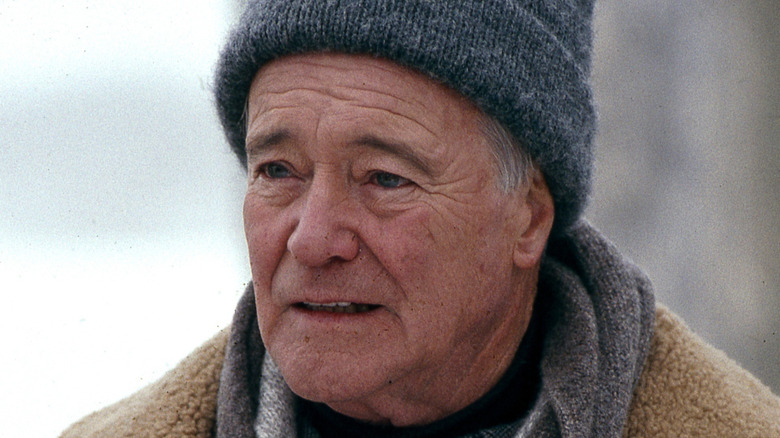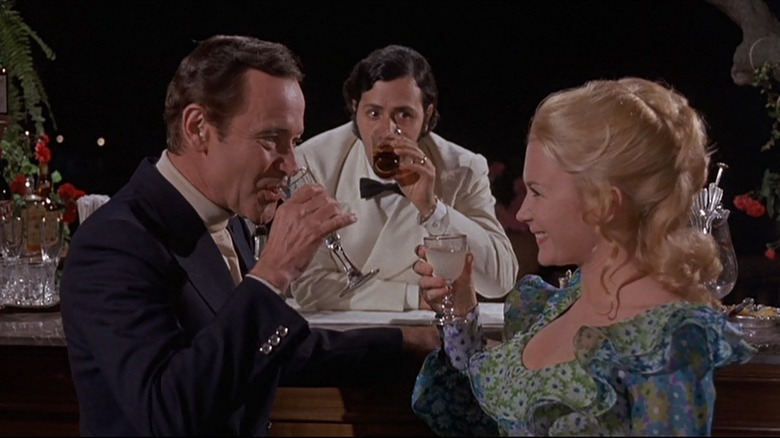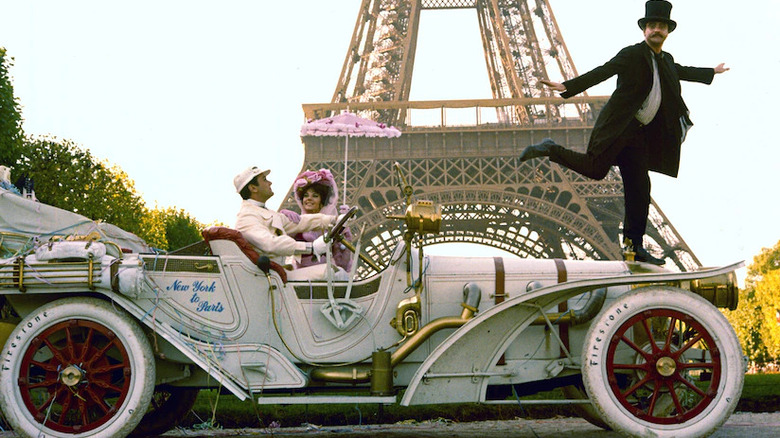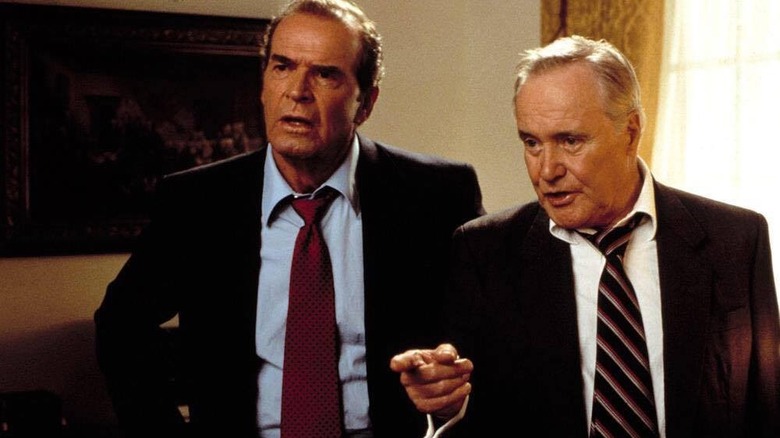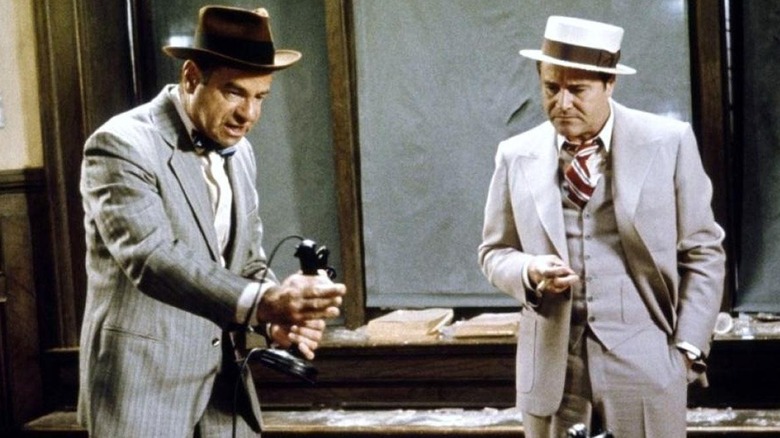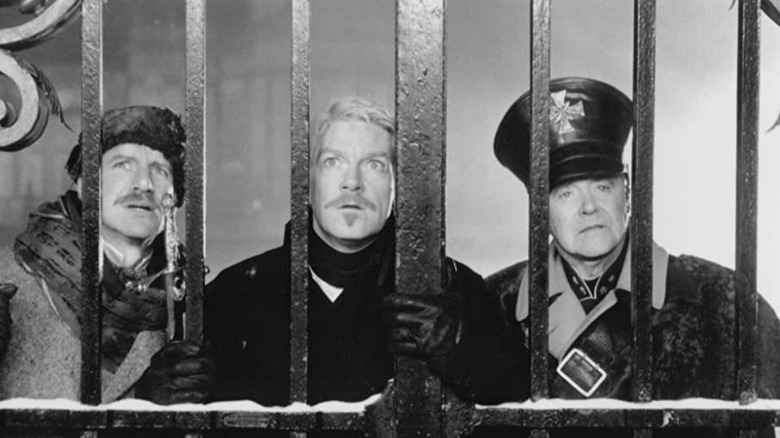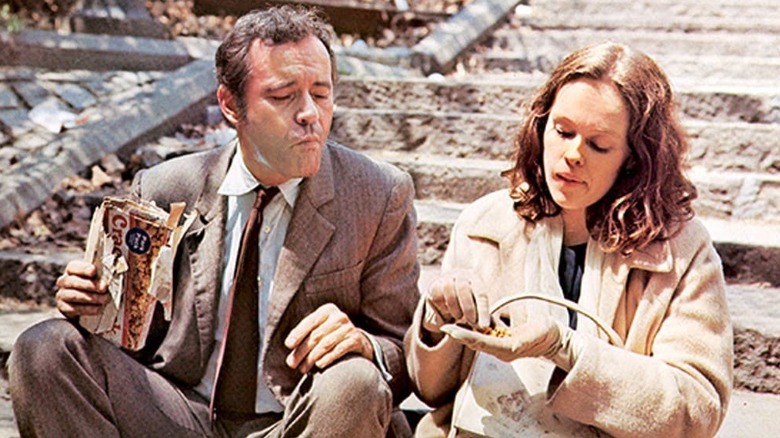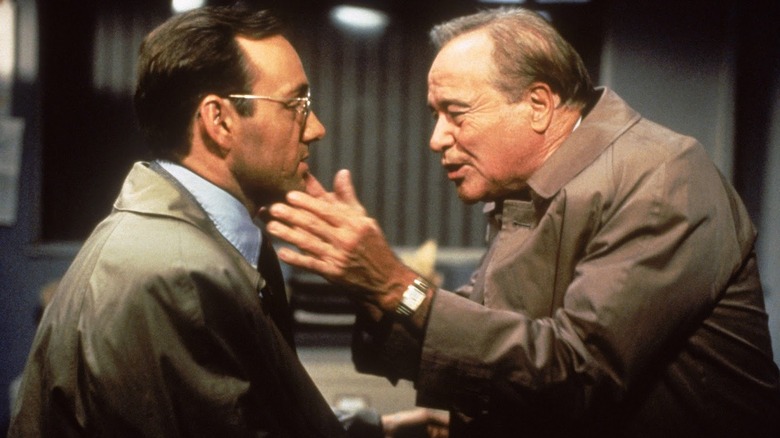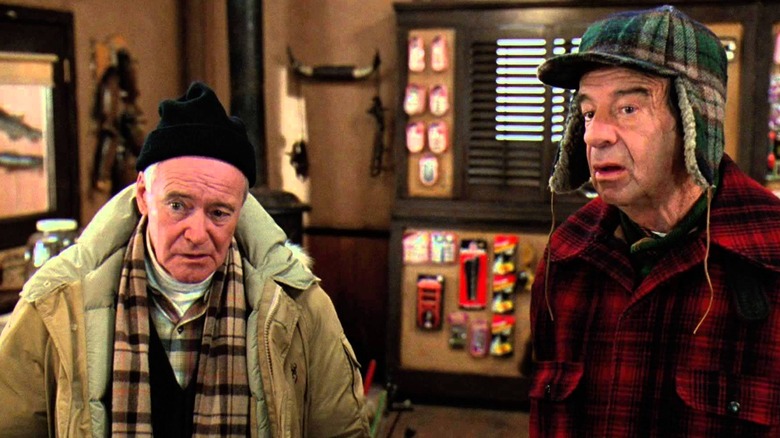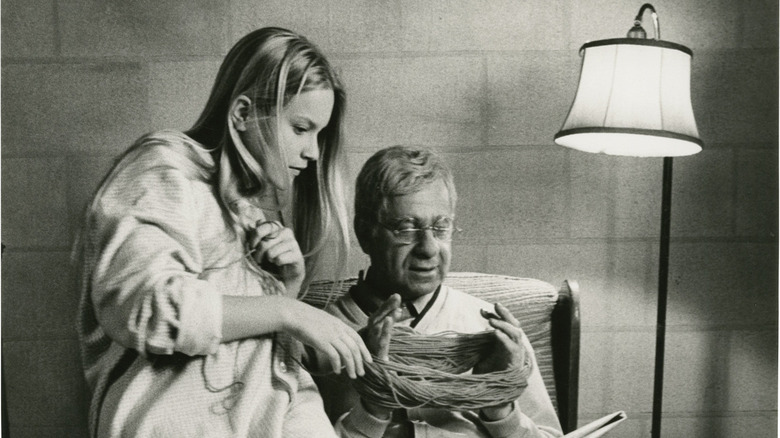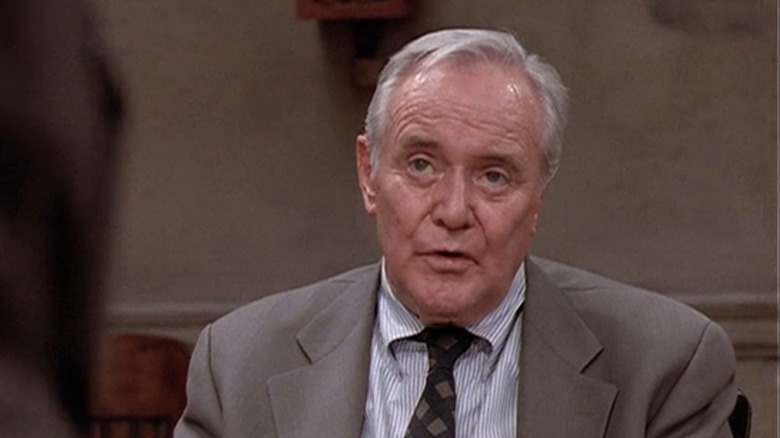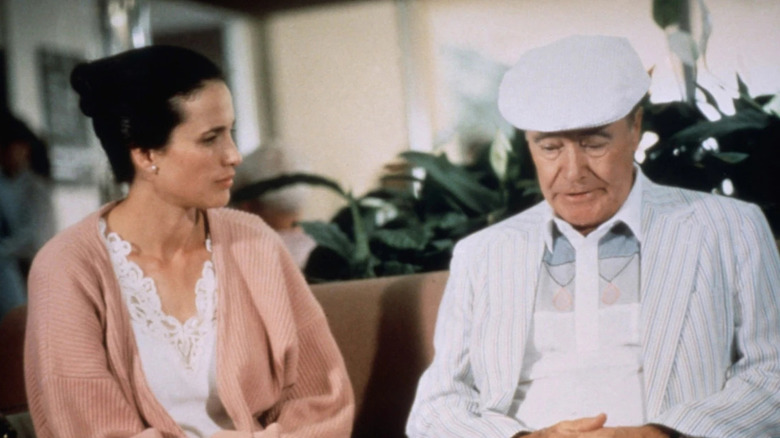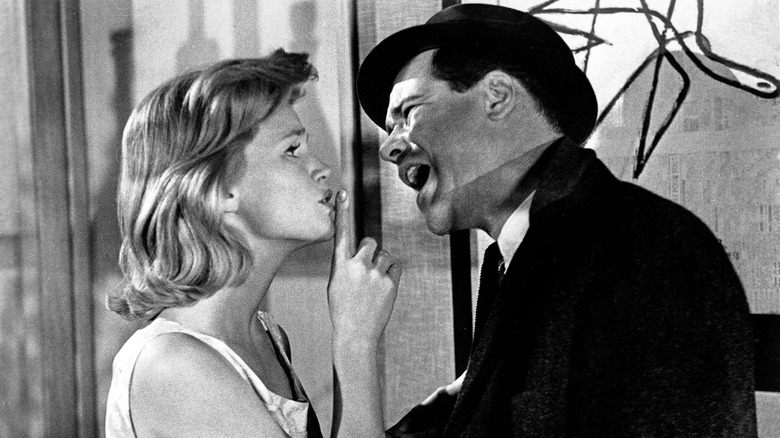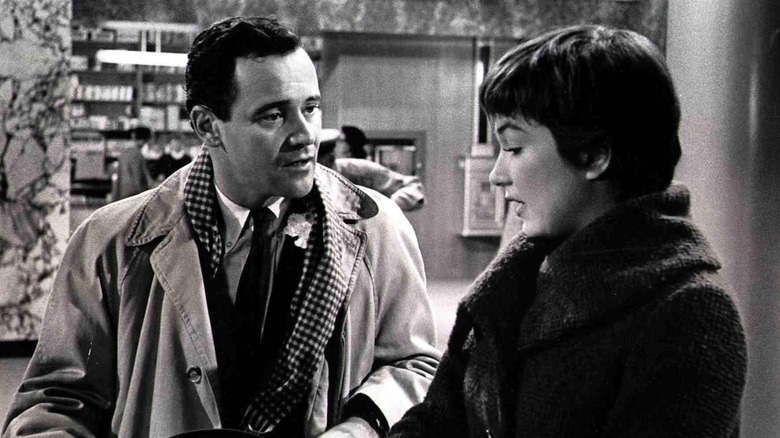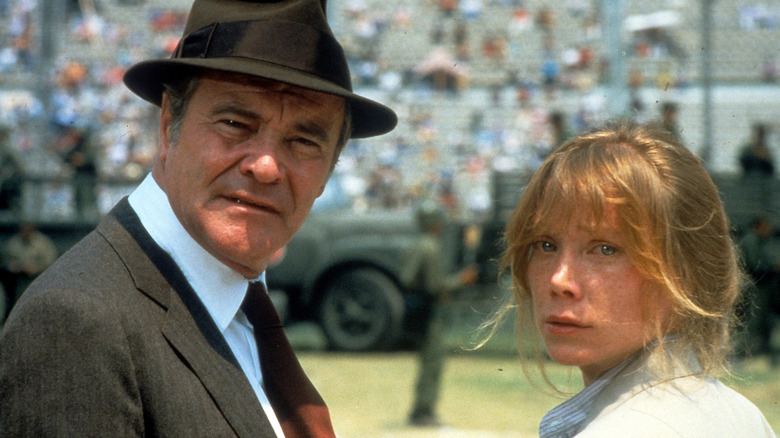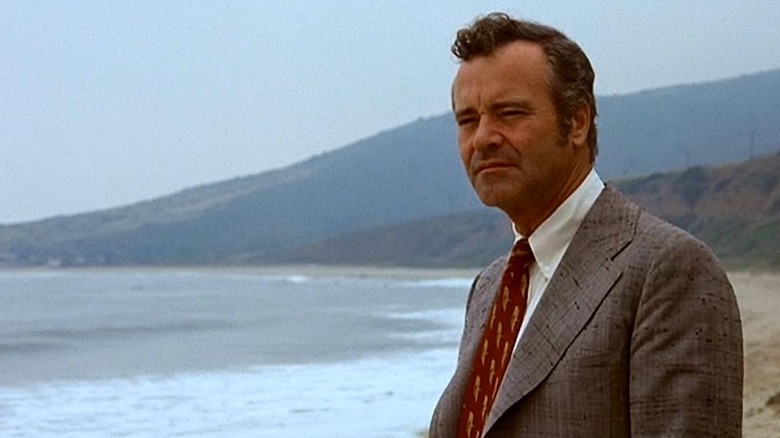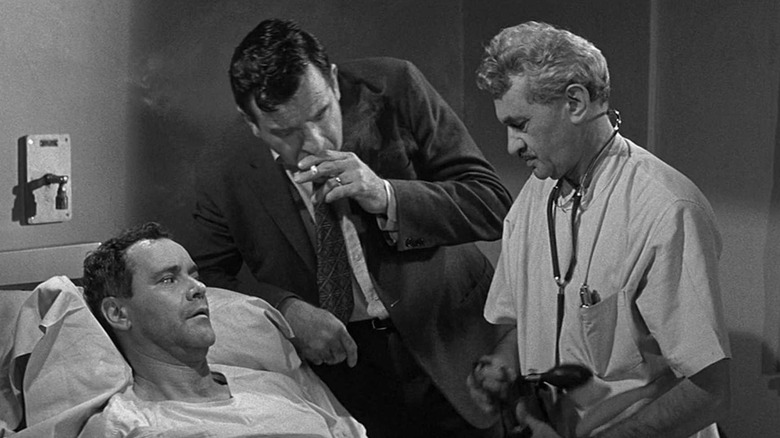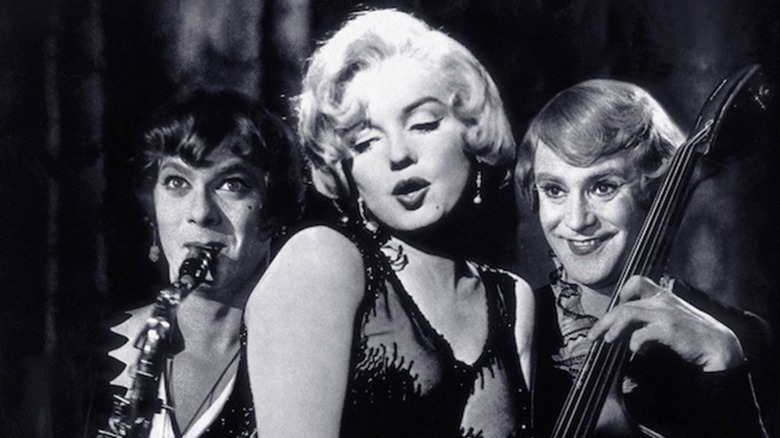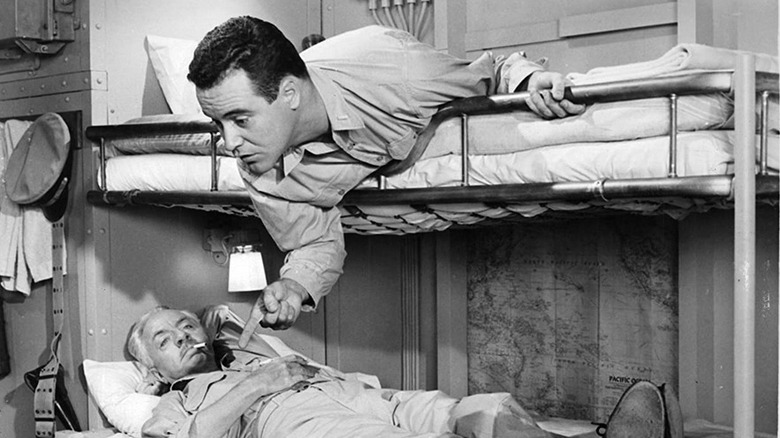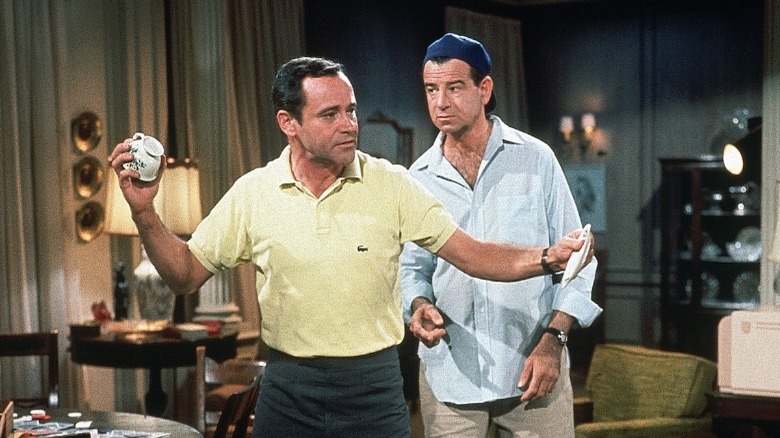The 20 Greatest Jack Lemmon Roles, Ranked
If anyone deserves to be called a Hollywood legend, it's Jack Lemmon. John Uhler Lemmon III was born on February 8, 1925, in Newton, Massachusetts, to Irish Catholic parents. During World War II, Lemmon served as an ensign on the Naval aircraft carrier USS Lake Champlain — it was only after the war ended and he graduated from Harvard in 1947 that his acting career began.
Lemmon's first feature film role was an uncredited appearance in 1949's "The Lady Takes a Sailor." In 1954, he landed a part opposite Judy Halliday in "It Should Happen to You," and the rest is cinematic history. The Massachusetts son is perhaps best known for his collaborations with Walter Matthau, with whom he made 11 movies, but Lemmon worked almost constantly until he died in 2001, starring in 61 feature films. His expansive credits list includes hundreds of television and radio appearances, a dozen television movies, shorts, voiceover roles, and many parts in the theater and on Broadway.
Over the course of his extensive career, the beloved actor garnered 12 major award wins, along with a number of other honors and nominations. He also received an American Film Institute life achievement award, Kennedy Center Honors, and the Cecil B. DeMille Award at the Golden Globes. That's a legacy that's more than worth celebrating. As such, here are his very best roles, ranked from worst to best.
20. Avanti!
"Avanti!" is based on a play by Samuel Taylor, and was adapted for the screen by Billy Wilder and I.A.L. Diamond — it's one of seven successful collaborations between Wilder and Lemmon.
In Italian, "Avanti!" roughly translates to "Come In!," "Let's Go!," and "Onward!," which makes it a pretty good way to epitomize the film's story. "Avanti!" follows Baltimore native Wendell Armbruster Jr. (Lemmon) as he travels to Italy to bring home his father's body. While on the isle of Ischia, Wendell Jr. meets Pamela Piggott (Juliet Mills), the daughter of his father's mistress. They comfort each other, and soon follow in their parent's footsteps, surrendering to love — but the romance comes with some major missteps.
"Avanti!" is a nuanced and hilarious story about love and life in which America meets the undeniable slow sophistication and beauty of the Italian coast. Released to somewhat finicky reviews, "Avanti!" is now considered a Billy Wilder classic. And yet, even at the time, Lemmon's performance was celebrated — he received a Golden Globe award for best actor for the film. On Lemmon's crowded filmography, this one is a hidden gem worthy of your attention.
19. The Great Race
Director Blake Edwards reunites Jack Lemmon with Tony Curtis in "The Great Race," a film that parodies classic Victorian melodramas.
Professor Fate (Lemmon) is a professional daredevil who is in constant competition with a fellow adventurer, The Great Leslie (Tony Curtis). So, when Leslie organizes an auto race from New York to Paris, Professor Fate is naturally the first to enter. Fate is accompanied by his henchman Max (Peter Falk). Also competing in the race is a journalist named Maggie Dubois (Natalie Wood), a pushy suffragette who is determined to cover the race at all costs. Lemmon plays dual roles: He appears as both Professor Fate and the drunken Pottsdrof Prince, Friedrich Hapnick.
The movie's storyline was inspired by a real competition held in 1908, in which six cars from around the world raced from New York to Paris. In the film, the Great Leslie's car, the Leslie Special, resembles a Thomas Flyer, which won the actual 1908 race. Initially budgeted at $6 million, "The Great Race" cost $12 million to make. The many sight gags were extremely expensive, but it was worth it: The film includes one of the largest pie fights ever filmed.
18. My Fellow Americans
"My Fellow Americans" tells a simple story. It follows former presidents Russell Kramer (Lemmon) and Matthew Douglas (James Garner), who, when faced with scandal, join forces to uncover a current corrupt president's (Dan Aykroyd) conspiracy. In order to do so, they head out into the heart of America to expose the culprits and clear their names. While there, they learn a little about themselves and the country they both represented.
Co-written by E. Jack Kaplan, Richard Chapman, and Peter Tolan and directed by Peter Segal, contemporary critics referred to the film as "Grumpy Old Presidents" in homage to the Lemmon and Matthau hit the previous year. Matthau isn't actually in the film, but the movie does star cinematic legend Lauren Bacall as Margaret Kramer and brilliant character actor Wilford Brimley as Joe Hollis.
"My Fellow Americans" is genuinely enjoyable, with memorable chase and train scenes, beautiful Midwestern scenery, and lots of comedic characters. All the while, the general buffoonery underscores the retired politicians' growing humanity. Jack Lemmon and James Garner are perfect partners, conveying an easy-going charm and relatability, reminding one of their parents or eccentric uncles. While it was skipped over for most accolades, "My Fellow Americans" is what a film should be: pure entertainment.
17. The Front Page
Billy Wilder directs Jack Lemmon and Walter Matthau in the third film pairing for the comedic duo, following 1966's "The Fortune Cookie" and 1968's "The Odd Couple." Wilder collaborated with writer I. A. L. Diamond to update this 1920s Chicago newspaper farce, which was originally written for the stage by Ben Hecht and Charles MacArthur.
The story follows Hildy Johnson (Lemmon), the "best" crime reporter in Chicago. Hildy falls in love and wants to marry a young organist, Peggy Grant (Susan Sarandon). So, he decides to quit his job at the Chicago Examiner and move to Philadelphia. However, his editor, Walter Burns (Matthau), finds out, and stops at nothing to keep Hildy in Chicago.
"The Front Page" is classic Lemmon and Matthau, crossed with the antics of the Three Stooges. Lemmon maintains his chaotic comic persona throughout the folly, while Matthau's portrayal of a snarling, unscrupulous, maniacal editor is the perfect counterpoint to Lemmon's reserved Hildy. The film is hilarious and performed at breakneck speed, and earned both Lemmon and Matthau Golden Globe nominations for best actor.
16. Hamlet
Kenneth Branagh directs this stylized adaptation of the 16th-century play by William Shakespeare. "Hamlet" is, of course, a cinematic retelling of the story of the titular Prince of Denmark, who returns home to find his father murdered and war threatening to destroy his country. Even worse, his mother is set to marry his uncle, the man responsible for his father's death.
Combing Shakespearian folios, this is the first unabridged film version of the play. Dame Judi Dench, Derek Jacobi, Julie Christie, and Charlton Heston complement Branagh's Prince Hamlet. As for Lemmon, he makes a cameo appearance as Marcellus, a soldier at castle Elsinore who alerts Horatio to King Hamlet's ghost; he is present when the prince first encounters the spirit. While it's a minor part, it is a pivotal scene that sets the stage for the rest of the story.
In an interview for the Chicago Tribune, Branagh commented on casting Jack Lemmon: "Marcellus has one beautiful passage early on for a simple man, and I wanted somebody who could come on with that sense of ordinariness, someone whose presence would be startling and make the audience sit up and take note." Naturally, Jack Lemmon delivers.
15. The Out-of-Towners
Arthur Hiller sits in the director's chair for this cinematic sitcom, which was written by Neil Simon. "The Out-Of-Towners" revolves around George (Lemmon) and Gwen Kellerman (Sandy Dennis), a simple upper-middle-class couple from Ohio who travel to New York City for the first time.
At first, the prospect of visiting New York City thrills the Kellermans, but, as with all well-planned cinematic trips, everything goes wrong. Through a series of improbable scenarios, "The Out-Of-Towners" epitomizes every traveler's worst nightmare. And yet, the film is very, very funny. Its humor develops from the frustration of those characters' exaggerated situations.
Filmed on location in Manhattan, the film finds authenticity in NYC's contemporary issues. The city experienced a transit strike in 1966, a sanitation strike in 1968, and an extreme rise in crime, and that chaos provides a perfect backdrop for the family Kellerman's nightmare. According to Simon, Jack Lemmon accepted the role without reading the script. However, as funny as it is, the film opened to mixed reviews, and Lemmon was less than pleased with the final version.
14. Glengarry Glen Ross
At an age when most would consider retiring, Jack Lemmon continued to hunt out challenging roles, like the character of Shelley "The Machine" Levene in "Glengarry Glen Ross." The film follows four ferociously competitive real estate salesmen whose desperation mounts when they learn that all but the top two performers will be fired. Levene, a once-great salesman, can't seem to close a deal. He is hindered further by office manager Williamson, who controls the disbursement of the sales leads and uses the sought-after Glengarry Highlands real estate development to curry favor.
In an acting tour-de-force, Jack Lemmon portrays Levene as the failure of the American Dream. Once successful, he's now utterly defeated. Just watch Lemmon's performance as Levine accepts his boss' debilitating tirade, recognizing that his career is through.
Filmed on location in New York City, James Foley's "Glengarry Glen Ross" is a dirty and gritty examination of masculinity that strikes a chord to this day thanks to its legendary collection of actors, which critic Phillip French once called "one of the best American casts ever assembled."
13. Grumpy Old Men
"Grumpy Old Men" confirmed what most Jack Lemmon fans already knew: that he was a consummate actor, and that Lemmon and Matthau were a legendary cinematic comedy team. Their 1993 on-screen reunion, "Grumpy Old Men," reinvigorated Lemmon's career and was a big enough hit to spawn a sequel, "Grumpier Old Men," which was released in 1995.
"Grumpy Old Men" was written by Mark Steven Johnson and directed by Donald Petrie. This endearing film is all about friendship and age, and exudes Midwestern charm and sensibilities. It is the tale of two former best friends, Max Holdman (Matthau) and John Gustafson (Lemmon), who live in the same neighborhood. Their long-standing childlike feud escalates when a vivacious widow, Ariel Truax (Ann Margret), moves into the house across the street, and they both vie for her attention.
Supported by an all-star cast, "Grumpy Old Men" was a runaway hit. Released on Christmas Day, it grossed almost $4 million on its opening weekend on its way to a $70 million take.
12. Kotch
Based on Katherine Tompkins' novel and adapted for the screen by John Paxton, "Kotch" was Jack Lemmon's directorial debut. Although he only makes a cameo in the film, it's clearly a Lemmon production: He cast his wife, Felica Farr, in a key role, and it stars his best friend, Walter Matthau, who agreed to make the film without reading the script.
"Kotch" is a typical "coming of old-age" story. It chronicles the life of septuagenarian Joseph Kotcher (Walter Matthau), who is forced to leave his family home by his son, Gerald (Charles Aidman), and daughter-in-law, Wilma (Felicia Farr). Instead of settling into a retirement home, however, Kotch embarks on a cross-country adventure, and soon finds his "second act" when he teams up with Erica (Deborah Winters), a pregnant young woman who needs his protection and care.
Matthau received an Academy Award nomination for best actor for the film, while composer Marvin Hamlisch won the Golden Globe for best original song. Lemmon, however, never directed another film again.
11. 12 Angry Men (1997)
"12 Angry Men" was a made-for-television update of the classic 1957 film. Reginald Rose wrote the teleplay, and William Friedkin directed an all-star cast.
The film's premise is brilliantly simple. Even in an ethnically diverse juror box, bias, prejudice, and group-think remain. Juror #8 ( Lemmon) is the lone dissenting voice against the unanimous conviction of a Latino defendant accused of murder, claiming that the evidence is primarily circumstantial. As deliberations progress, however, more members of the panel change their minds. Before long, the trial of an oppressed youth becomes a commentary on prejudice, revenge, and social justice.
It's a role seemingly tailored for the then-aged 72-year-old actor, and Lemmon imbued the part with strength and grace. In one extreme but pivotal exchange with Juror #3 (George C. Scott), Lemmon calmly exclaims, "You're a sadist," pointing out #3's reasons for voting to convict. "12 Angry Men" won two Primetime Emmy Awards, but Lemmon only received recognition as part of the ensemble cast.
10. Short Cuts
Later in his career, Jack Lemmon's considerable acting prowess enabled him to pick and choose roles that interested him. Given that he only has one scene in the movie, "Short Cuts" could be seen as such a part.
Director Robert Altman's eclectic episodic narrative is based on nine short stories by Raymond Carver, and details the lives of a dysfunctional family in contemporary Los Angeles. Playing the guilty, self-deluding grandparent Paul Finnigan, Lemmon arrives at the hospital, where Finnigan's grandson Casey (Zane Cassidy) lies in a coma. Lemmon's timbre and style contribute to a memorable rambling monologue as he attempts to justify his parental failings to his estranged son, Howard (Bruce Davison).
Due to unforeseen scheduling conflicts, Lemmon shot his scene in one continuous take, which is a testament to his professionalism. While he wasn't individually recognized for any awards, Lemmon's small part in "Short Cuts" remains one of his most relatable characters.
9. Days of Wine and Roses
Blake Edwards' "Days of Wine and Roses" was one of the first Hollywood features to address alcoholism. Bill Wilson, the co-founder of Alcoholics Anonymous, even functioned as the film's technical advisor.
Written by J.P. Miller, "Days of Wine and Roses" was staged initially as a live teleplay for CBS TV "Playhouse 90" before it was adapted for the screen. The movie chronicles the life of Joe Clay ( Lemmon) and Kirsten Arnesen (Lee Remick), an ordinary New York couple who met at a work event and soon fall in love. After Joe and Kirsten get married, Joe's work-induced "social drinking" worsens. Eventually, Joe descends into crippling addiction, dragging Kristen down with him.
The character allowed Lemmon to explore his significant dramatic range. Later, Lemmon admitted that he drew on his then-unknown experiences as an alcoholic for the part, resulting in an Oscar-nominated performance. "Days of Wine and Roses" was chosen for preservation by the National Film Registry in 2018.
8. The Apartment
Yet another cinematic collaboration between Billy Wilder and I.A.L. Diamond, "The Apartment" reunited Jack Lemmon with Shirley MacLaine for a bittersweet comedy that comments on ambition and society's growing commercialism.
The film follows an enterprising young and ambitious New York insurance clerk, C. C. Baxter (Jack Lemmon), who gains corporate favor by lending his apartment to his bosses for their trysts. Naturally, complications arise, especially after he falls in love with his boss' mistress, Fran Kubelik (Shirley MacLaine).
"The Apartment" is credited with establishing Jack Lemmon's on-screen persona — that of an excitable and bewildered middle-aged man who achieves personal growth through pain and sacrifice. The film received rave reviews, and was the last black-and-white film to win the best picture Oscar until "Schindler's List" 33 years later. Lemmon won a BAFTA and Golden Globe for the movie, but only managed to score a nomination from the Oscars.
7. Missing
"Missing" was directed by Costa-Gavras and co-written by Gavras and Donald Stewart. It is a daring political docu-drama surrounding the disappearance and execution of American writer Charles Horman during the Pinochet coup.
The film follows Ed Horman (Lemmon), a bemused, middle-class American father who travels to Santiago, Chile, to find his arrested journalist son, Charlie (John Shea). He is joined in his search by his daughter-in-law, Beth (Sissy Spacek). Horman, a conservative businessman, assumes that Charlie is guilty, but instead learns that his son was just in the country to help. Horman experiences a series of bureaucratic catastrophes and encounters the harsh violence typical of life outside of the protective bubble of the United States of America.
Anxious and naïve, Horman was seemingly written for Jack Lemmon. Because of its subject, it's considered one of Jack Lemmon's most daring roles, and earned him a best actor nomination for his efforts.
6. Save the Tiger
"Save the Tiger" flopped at the box office, but John Avildsen's film has at least one bright spot: Lemmon, who received critical recognition for his turn as Harry Stoner, an American businessman suffering through a midlife crisis.
Stoner's Los Angeles fashion house is failing, and so he contemplates insurance fraud. To pull it off, he first argues with his much more ethical business partner, Phil Greene (Jack Gilford), then secretly meets with an arsonist, Charlie Robbins (Thayer David). Along the way, he also contemplates a relationship with a young hippie, Myra (Laurie Heineman). All the while, he rages, "I wanna be in love with something ... Anything. Just the idea. A dog, a cat. Anything. Just something."
Lemmon's acting prowess is evident in this performance. The Academy agreed: "Save the Tiger" earned Lemmon his second Oscar, this time for best actor, for his authentic portrayal of a man facing the death of the American Dream.
5. The Fortune Cookie
In the film "The Fortune Cookie," director Billy Wilder made history. By introducing Lemmon to the classically-trained Walter Matthau, Wilder found the perfectly disheveled and gruff foil to Lemmon's more meticulous, flustered stylings. Little did anyone know, however, that this casting would result in a life-long friendship between the two stars.
"The Fortune Cookie" is a screwball comedy about sports cameraman Harry Hinkle (Lemmon) who, while covering a match, is injured by star player "Boom-Boom" Jackson (Ron Rich). Seizing on the opportunity, Hinkle is convinced by his scheming brother-in-law, attorney Willie Gingrich (Walter Matthau), to sue. However, Hinkle's desire to win back his ex-wife (Judi West) and maintain a friendship with the guilt-ridden Jackson makes him question the ploy.
The film is yet another collaboration between Wilder and I.A.L. Diamond, and, like many of their other projects, received praise during awards season. Matthau won an Oscar for best supporting actor for the film, and Wilder and Diamond got a nod for best screenplay. Jack Lemmon's performance, however, was ignored by the Academy.
3. Some Like It Hot
"Some Like It Hot" follows Joe (Tony Curtis) and Jerry (Lemmon), two Chicago jazz musicians who accidentally witness a Mafia-style murder. Needing to flee town, the men disguise themselves as women and join an all-female band. However, complications arise when Joe poses as a millionaire to impress a singer named Sugar (Marilyn Monroe) and "Daphne" (Jerry's female alter ego) catches the eye of an actual millionaire.
Director Billy Wilder's raucous black and white Prohibition-era comedy may not have pleased its first audience, but it's been considered one of the funniest films of all time ever since, and contains one of Lemmon's best comedic roles. "Some Like it Hot" received six Academy Award nominations, including one for best actor; Lemmon didn't win that one, but he did take home a Golden Globe and a BAFTA Award, so things turned out okay.
2. Mister Roberts
Only four films into his Hollywood career, the 30-year-old Lemmon landed the role of the lazy Ensign Pulver in the Naval comedy "Mister Roberts."
Written by Thomas Heggen and published in 1946, the short novel "Mister Roberts" was an immediate sensation, selling over a million copies. During World War II, Heggen was an assistant communications officer on the USS Virgo, and he modeled his book's hero on his shipboard friend, Lieutenant Charles Roberts. The story follows the exploits of the men aboard the fictional USS Reluctant, who are captained by a petty tyrant.
"Mister Roberts" was adapted for Broadway in 1948, with Henry Fonda in the lead role. He reprised his part for the film adaptation, which was co-directed by Mervyn LeRoy and John Ford, the latter of whom personally asked Lemmon to appear in the movie after seeing his screen test.
"Mister Roberts" highlights Lemmon's versatility in both dramatic and comedic parts, and is considered one of his early breakthrough roles. He more than holds his own against an all-star cast of Henry Fonda, William Powell, and James Cagney, and was rewarded with an Oscar for best supporting actor for his efforts.
1. The Odd Couple
Writer Neil Simon and director Gene Saks' "The Odd Couple" is Jack Lemmon's and Walter Matthau's second film together, and possibly their most famous. Set in New York, it is a hilarious comedy that epitomizes the pair's easy-going relationship.
Felix Ungar (Jack Lemmon) and Oscar Madison (Walter Matthau) have both recently divorced, but while Oscar seems to have moved on, Felix is not taking his situation very well. Sympathizing with his friend's plight, Oscar suggests that Felix move in with him. However, Oscar, an easy-going slob, soon discovers that Felix is a neurotic neat freak. Committed to being roommates, they immediately begin to drive each other up the wall.
Felix Unger is considered one of Jack Lemmon's most recognizable roles, and "The Odd Couple" is a delicious combination of drama, reality, and comedic timing that stands up to this day — it even received a television adaptation, which starred Tony Randall and Jack Klugman, in 1970. The film's iconic theme song, which was written by jazz trumpeter Neal Hefti, also supported the television series.
